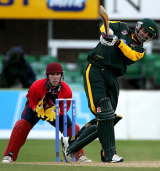
|

'It's more a case of going out there and having some fun. It's not really the ultimate in cricket or anything' - Mongia
© Getty Images
|
|
He's celebrating his 30th birthday quietly in Mumbai, playing Twenty20
cricket for Punjab, but Dinesh Mongia could well be in for a career
resurgence thanks to this form of the game. He's of course no stranger to
career dips and ups. He's been in and out of the Indian team since he made
his debut in 2001, coming back to the side for the 2003 World Cup and again almost making the cut for the squad that went to the West Indies to the 2007 edition.
He won't be happy with the 55 ODIs he's played, scoring 1196 runs at
28.47, yet believing he should have got a longer run. But when it comes to
Twenty20 cricket, he's far and away the most experienced of all the
Indians. With 29 Twenty20 matches, most of them for Lancashire and
Leicestershire in England, he shades the bigger names like Sachin
Tendulkar and Rahul Dravid, who have barely wet their toes in this form of the game.
Surprisingly, though, even with all his experience, Mongia feels that
playing Twenty20 is no different from 50-over cricket. "See, it's still a
game of bat and ball," he told Cricinfo, after expressing surprise
that someone remembered it was his birthday, which falls one week before
the biggest birthday in Indian cricket, Tendulkar's on April 24.
"The way I look at it, you still have to play your natural game. I like to
go for my shots, so it doesn't really make that much of a difference to
me."
Although Dinesh Karthik walked away with the Man-of-the-Match award in the
only Twenty20 international India played, against South Africa, Mongia had
a big role to play, making 38 runs in a tight chase. "It's not that
serious a form of the game at the moment," said Mongia. "It's more a case
of going out there and having some fun. It's not really the ultimate in
cricket or anything."
But Twenty20 cricket is serious business in some parts of the world. The
kind of attention it has drawn in England, where the game was conceived, is
phenomenal, and it has done more to attract audiences to the game,
especially in domestic cricket, than anything else. Twenty20 matches have
been pencilled into the family calendars, and a game between the
Leicestershire Foxes and the Lancashire Lightning, both teams Mongia has
played for, is more likely to draw a full house than not. But Mongia
doesn't see that happening in India. "Look, let's be honest, I don't
really see that happening here. In India people only go to the ground for
international matches," he said. "Of course it would be brilliant if
people came and supported their teams like it happens in England. It's a
huge difference playing in that atmosphere. But here, even with
international stars playing, whether it is in the Ranji Trophy or Duleep [Trophy], we
can't seem to draw crowds for domestic cricket."
 Since it is being held in India for the first time, people make so many assumptions and say 'bowl like this', 'bat like this'. People must first play and experience it and then decide how it should be played
Since it is being held in India for the first time, people make so many assumptions and say 'bowl like this', 'bat like this'. People must first play and experience it and then decide how it should be played
 |
The game, which is still being played on an experimental level in
India, has yet to evolve like it has in England.
"The more you play and the more experience you gain, it will become easier
to adapt and try different things. You need more time to think about it
and more time to learn to play it," Mongia said, but stressed that there
was no need to try and do things dramatically differently, adding, "skills
and intelligence will make one a successful player".
One of the problems players have faced in this edition is going into the
game with an approach of trying to hit everything out of sight. That, as
Mongia correctly points out, is not the way forward. "Just like how
one-day cricket became the shorter version of Test cricket this has become
a shortened version of one-day cricket," he said. "Since it is being held
in India for the first time, people make so many assumptions and say 'bowl
like this', 'bat like this'. People must first play and experience it and
then decide how it should be played."
Mongia has had his share of fun in the shortest version of the game, but
the most amusing came when he was bowling for Lancashire in the Twenty20
semifinal against Surrey in 2004. Mongia had sent down two overs for just six
runs, picking up a couple of wickets and his captain, Andrew Flintoff,
walked across to him. "If you bowl like this you won't be too popular, the
crowds will not come to watch this. People come to watch batsmen score
runs," Flintoff said to him, obviously in jest. It might be all fun and
games for the players at the moment, but Twenty20 is set to take root in
India, and when it does, you can be sure it will be serious business, both
on and off the field. And who knows, for someone like Mongia it could well
throw a fresh lifeline. Already there are plenty of one-day specialists,
who don't get a look-in in Tests. The day of the Twenty20 specialist is
not far.
Anand Vasu is associate editor of Cricinfo

